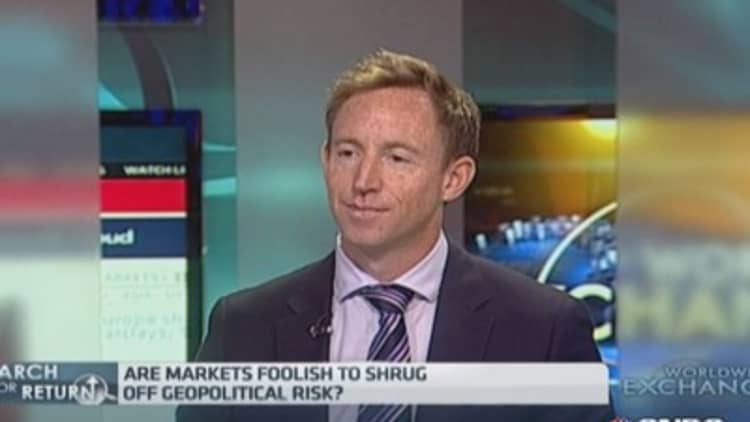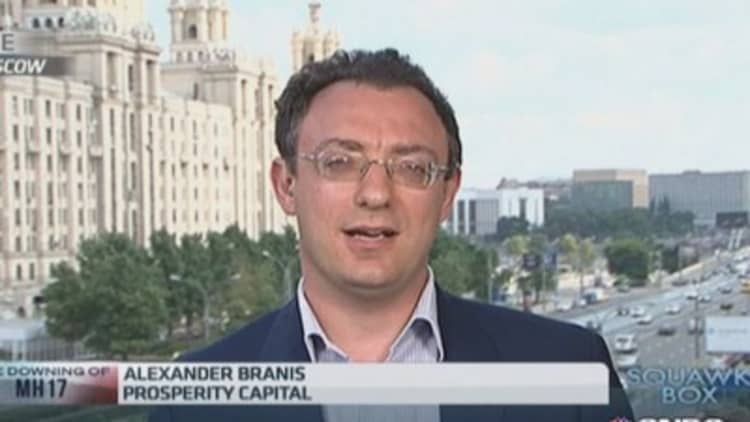EU diplomats will weigh sweeping Russian sanctions on Thursday that include a proposal to ban all Europeans from purchasing any new debt or stock issued by Russia's largest banks, according to a proposal seen by the Financial Times.
The sanctions measure, contained in a 10-page options memo prepared by the European Commission and distributed to national capitals, also proposes barring the Russian banks from listing new issues on European exchanges, preventing them from using London or other EU stock markets to raise funds from non-Europeans.

The proposal would not initially include a similar prohibition for Russian sovereign bond auctions out of fear the Kremlin could retaliate by ordering an end to Russian purchases of EU government debt, the document states.
But it would still be far more extensive than sanctions imposed by the U.S. earlier this month that only targeted two Russian banks, Gazprombank and VEB, since the EU proposal would hit all banks with more than 50 percent public ownership.
Read MoreUkraine crisis:Fears rise of Russia-fueled arms race
State-controlled financial institutions account for the majority of banking assets in Russia, and the document estimates 7.5 billion euros of the 15.8 billion euros in bonds issued by Russian public financial institutions last year were in EU markets.
"[T]he measure would consist in prohibiting any EU persons from investing in debt, equity and similar financial instruments with a maturity higher than 90 days, issued by state-owned Russian financial institutions…anywhere in the world," the document states.
Although Thursday's meeting of EU ambassadors will be the first time diplomats have formally discussed such broad-based sanctions against Russian economic sectors, the capital markets ban remains unlikely. The measure would have to be agreed unanimously by all 28 EU members, and several countries have repeatedly shown a reluctance to agree such sector-wide sanctions.
The options paper, which was sent to national capitals Wednesday night, for the first time shows how extensive the preparations are in Brussels to move towards sweeping penalties that could cripple the Russian economy.
More from the FT:
MPs hit out over UK arms sales to Russia
Obama pressed to act against Russia
EU energy plan targets Russian gas links
"Restricting access to capital markets for Russian state-owned financial institutions would increase their cost of raising funds and constrain their ability to finance the Russian economy, unless the Russian public authorities provide them with substitute financing," the document reads.
"It would also foster a climate of market uncertainty that is likely to affect the business environment in Russia and accelerate capital outflows. "
The existence of the document - titled "Outline of an initial package of targeted measures in the areas of access to capital markets, defense, dual use good and sensitive technologies" – was first reported by the Greek daily To Vima. The copy obtained by the FT was the final version sent to national diplomats late on Wednesday.
In addition to the capital markets ban, one of the most onerous measures included in the document is a proposed restriction on exporting "sensitive technologies", which would include components needed by Russia's critical energy sector.

The ban on such technologies would incorporate a licensing system similar to that used in sanctions against Iran, and would be target equipment in three sectors: deep-sea drilling, artic exploration and shale oil extraction. Although natural gas technologies were originally considered in earlier drafts, gas-related projects would not be affected in the final proposal.
Although the document says such energy-related technologies account for only 150 million euros in annual EU exports to Russia, the European Commission believes the restrictions, which are being pushed by the US, could hit Russian companies hard since they would not be able to find key components elsewhere.
"Russia needs EU technologies to develop some of the most competitive and export-oriented sectors of its economy, including energy and steel production," the memo says. "The possibility for Russia to substitute such products and technologies originating from the EU or U.S. is low in view of the likely unavailability of similar products."
Read MoreUK and France in warof words over Russia
Other options included in the paper are an arms embargo, though the paper says the EU exports only about 300 million euros in weapons to Russia and it would largely affect the 3.2 billion euros in armaments imported from Russia by Europe. Many ex-Warsaw Pact countries still rely on Russian-made military equipment.
The Commission also identified about 20 billion euros in dual-use exports – goods that can be used by both civilian and military manufacturers – that could be covered by sanctions, but recommends initially targeting about 4 billion euros in "highly sensitive" products such as machine tools and "high-performance computers and electronics".
The financial measures take up the largest section of the options memo, however, and would mirror U.S. efforts to pressure the Putin government by destabilizing Russian capital markets. U.S. officials repeatedly cite capital outflows as a primary achievement of their sanctions regime.
"[It] would push companies to seek state financing as a stop-gap, further straining the government's budget," the document states.Although the ban would only affect primary and secondary market transactions of newly-issued Russian securities – meaning all existing stock and bonds would not be covered – it would also prevent EU advisers from providing assistance or investment services for any of the banks covered by the ban.

